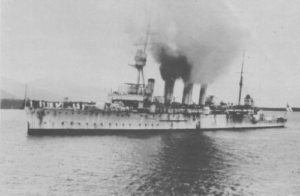- Author
- Clark, Bryan
- Subjects
- Biographies and personal histories, RAN operations, WWI operations
- Tags
-
- RAN Ships
- HMAS Sydney I
- Publication
- September 1989 edition of the Naval Historical Review (all rights reserved)
The boat began to fill at once with water. Two of us bailed it out while the third rowed desperately to make the gangway of the distant Sydney before the boat would wreck into splinters under the heavy sea. In the moonlight we could see the fins of a hundred sharks swimming about our little lifeboat. The lighted gangway of the Sydney at first never seemed to come nearer. The creaking of the boat warned us that it would not stand the pressure of the heavy swells for long. At last we drew alongside the gangway of the Sydney. It had been my turn to row and, consequently, I was the last to step from the boat onto the solid gangway. As I put my foot on the gangway I felt the lifeboat give way under me and when I turned around a second later there was nothing but a mass of disjointed timber, and many disappointed sharks, floating on the water.

The officers of the Sydney turned their lights upon us and at once proceeded to search us. This was an easy matter for among the three of us there was not a garment. I shall never forget how delicious was the cup of tea we were given. Days later we were transferred to a French cruiser and taken to Colombo. Herded together in a narrow passage at the bottom of the ladder, we were certainly treated as prisoners of war. With neither blankets nor clothing our suffering was greater. Some of the British sailors aboard brought us both food and blankets, but the French guards at the top of the ladder objected. On three occasions our friends threw the guards down the ladder and the blankets and food after them. Then strict orders were passed for our friends to keep away from the top of the ladder. This treatment seemed very unfair to me, in as much as we had always been kind to prisoners.
At Penang the Emden sank a French destroyer and, in the face of enemy fire, Captain von Mueller put out boats which picked up 36 French sailors. Although there was a scarcity of food and cigarettes aboard the ship, we shared them with our prisoners. When it came time for us to turn them over to another ship, many of the prisoners cried with gratitude. They said they had been told German sailors were inhuman beasts who maltreated their prisoners. We were transferred to H.M.S. Hampshire and taken to Malta.
I wish to explain that mine is only an experience similar to that of every comrade off the Emden. The things I did were also done by them and, I hope, I will not seem to have bragged in telling this story. There are only a few of us original “Emdens” left, about 50.1 think I have met a few of them since the war, but they do not seem to be the same. The experience at the Cocos Islands has taken something vital from every one.
It is a matter of history that the 49 who were left on the island (Direction Island to destroy the cable office) manned the Ayesha, an old schooner (belonging to Mr Clunies-Ross of the Keeling-Cocos Islands), and with little food and water sailed to the Arabian coast. Here they disembarked and trekked across the desert to Damascus. Emaciated, without clothes and scarcely able to go on, they found the people here would not believe their story because it seemed an impossibility they had performed. Two things that stand out in my memories of experiences on the Emden are the sight of the dying sailor who stumbled from his gun and with his dying breath gasped: “Three cheers for the Captain!” and the view of the French destroyer we sank at Penang. In the case of the latter, I had been in my fighting station, a small four feet-by-four cubby hole, in the hoisting room of the ammunition locker. The two motors in the room used for hoisting ammunition had exploded and the smell of burning rubber was suffocating me. My only light was a candle which flickered and went out after a few minutes when the oxygen supply gave out. It was against orders to open the armoured door during combat, so I stayed at my post until consciousness had just about left me. At last, however, a voice came to me through the speaking tube, ordering, “Pause in fighting.” With all the strength I had left I flung the door open and crawled out on deck into the reviving air.




